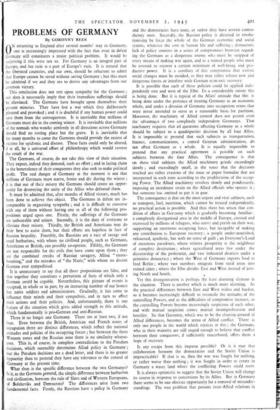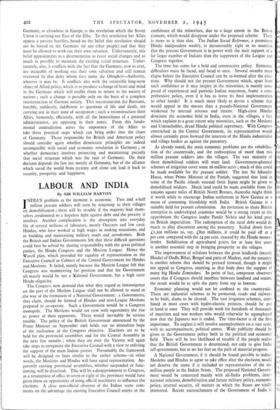PROBLEMS OF GERMANY
By GORON WY REES
ON returning to England after several months' stay in Germany, one is increasingly impressed with the fact that even in defeat Germany still constitutes a major political problem. It would be surprising if this were not so. For Germany is an integral part of Europe, and her ruin is a part of Europe's ruin. It is natural that 1 the liberated countries, and our own, should be reluctant to admit that Europe cannot be saved without saving Germany ; but this must be admitted if we and they are to derive any advantages from our common victory. This conclusion does not rest upon sympathy for the Germans ; nor does, it necessarily imply that their immediate sufferings should be alleviated. The Germans have brought upon themselves their present miseries. They have lost a war which they deliberately planned and provoked ; and it is doubtful if any human power could save them from the consequences. It is inevitable that millions of Germans must die in the coming winter. It is inevitable that millions lof the nomads who wander aimlessly in all directions across Germany should find no resting place but the grave. It is inevitable that for many months to come the Germans should provide the easiest of victims for epidemic and disease. These facts could only be altered, if at all, by a universal effort of philanthropy which would reverse
the result of the war.
The Germans, of course, do not take this view of their situation. They expect, indeed they demand, such an effort ; and in laying claim to the benevolence of their conquerors they also seek to make political profit. The real danger of Germany at the moment is not that millions of Germans must starve, freeze and die during the winter ; it is that out of their misery the Germans should create an oppor- tunity for destroying the unity of the Allies who defeated them. It must be admitted that, after months of Allied victory, much has been done to achieve this object. The Germans in defeat are in- comparable in organising sympathy ; and it is difficult to converse with any of them without having one or all of the following pro- positions urged upon one. Firstly, the sufferings of the Germans are unbearable and unjust. Secondly, it is the duty of everyone to alleviate their misery. Thirdly, the British and Americans may do their best to assist them, but their efforts are hopeless in face of Russian brutality. Fourthly, the Russians are a race of savage and cruel barbarians, with whom no civilised people, such as Germans, Americans or British, can possibly co-operate. Fifthly, the Germans are not responsible for the evils that have come upon them ; they are the combined results of Russian savagery, Allied " terror- bombing," and the mistakes of " the Nazis," with whom no decent German ever synipathised.
It is unnecessary to say that all these propositions are false, and that together they constitute a perversion of facts of which only a German could be capable. Nevertheless, this picture of events is accepted, in whole or in part, by an increasing number of our honest but naive soldiers and administrators. Gradually, it has come to influence their minds and their sympathies, and in turn to affect their actions and 'their policies. And, unfortunately, there is one feature of the situation which gives added strength to this attitude, which fundamentally is pro-German and anti-Russian.
There it no longer one Germany. There are at least two, if not four. Even between the British, American and French zones of occupation there are distinct differences, which reflect the national attitudes and policies of the occupying forces ; but between the three Western zones and the Russian zone there is no similarity whatso- ever. This is, of course, in complete contradiction to the Potsdam decisions, which ostensibly determines Allied policy in Germany ; but the Potsdam decisions are a dead letter, and there is no greater hypocrisy than to pretend they have any relevance to the control of Germany at the present time. .
What then is the specific difference between the two Germanys? Is it, as the Germans pretend, the simple difference between barbarism and civilisation, between the rule of Slays and of Western Europeans, of Bolsheviks and Democrats? The differences arise from two fundamental facts. Firstly, the Russians have a policy in Germany and the democracies have none, or rather they have several contra- dictory ones. Secondly, the Russian policy is directed to revolu- tionising by force the whole of the German economic and social system, whatever the cost in human life and suffering ; democratic lack of policy consists in a series of compromises between regard- ing the Germans as a dangerous enemy who must be stripped of every means of making war again, and as a ruined people who must be assisted to recover a certain minimum of well-being and pro- ductive power. It is a corollary of this compromise that violent social changes must be avoided, as they may either release new and dangerous forces or interfere with German economic recovery.
It is possible that each of these policies could be applied inde- pendently east and west of the Elbe. ro a considerable extent this
is being done. But it is typical of the Allies' attitude that this is being done under the pretence of treating Germany as an economic whole, and under a division of Germany into occupation zones that were never intended to serve as a reasonable basis for partition.
Moreover, the machinery of Allied control does not permit even the advantages of two completely independent Germanys. That machinery requires that all questions affecting Germany as a whole should be subject to a quadripartite decision by all four Allies. It is impossible to pretend that such subjects as transportation, finance, communications, a central German administration, do not affect Germany as a whole. It is equally impossible to pretend that any practical agreement is possible on such subjects between the four Allies. The consequence is that on these vital subjects the Allied machinery grinds exceedingly slowly ; and exceedingly small, in the sense that the decisions reached are either evasions of the issue or paper formulae that are interpreted in each zone according to the predilections of the occup- ing Power. The Allied machinery revolves slowly and ponderously, imposing an inordinate strain on the Allied officials who operate it ; but someone has omitted to put it in gear.
The consequence is that on the most urgent and vital subjects, such as transport, fuel, nutrition, which cannot be treated independently, no practical action is possible. And thus there has arisen that con- dition of affairs in Germany which is gradually becoming familiar : a completely disorganised area in the middle of Europe, crossed and recrossed by millions of refugees, who starve and perish on their way, supporting an enormous occupying force, but incapable of making any contribution to European recovery ; a people under-nourished, exhausted, apathetic, but with no sense of guilt ; an Everyone's-Land of enormous paradoxes, where relative prosperity is the neighbour of complete destitution ; where agricultural areas live under the dictatorship of the proletariat, and vast industrial districts under a primitive democracy ; where the West of Germany exports 'food to feed Berlin ; where vast numbers emigrate from rural areas into ruined cities ; where the Elbe divides East and West instead of join- ing North and South.
Yet this disorganisation is perhaps the least alarming element in the situation. There is another which is much more alarming. As the practical differences between East and West widen and harden, so it becomes increasingly difficult to reconcile the attitudes of the controlling Powers, and as the difficulties of compromise increase, so the controlling Powers become increasingly suspicious of each other, and with mutual suspicion comes mutual incomprehension and hostility. So that Germany, which was to be the clearing-ground of Allied differences, becomes the arena of Allied conflict. There is only one people in the world which rejoices at this ; the Germans, who in their majority are still stupid enough to believe that conflict between their conquerors, if sufficiently exacerbated, offers them a hope of recovery.
Is any escape from this impasse possible? Or is it true that collaboration between the democracies and the Soviet Union is impracticable? If .that is so, then the war was fought for nothing, or rather worse than nothing ; it was fought in order to create in Germany a waste land where the conflicting Powers could meet. It is always optimistic to suggest that the Soviet Union will change its course in response to concessions by its Allies. But in Germany there seems to be one obvious opportunity for a removal of misunder- standings. The root problem that poisons inter-Allied relations in
Germany, as elsewhere in Europe, is the revolution which the Soviet Union is carrying out East of the Elbe. To this revolution her Allies oppose a passive hostility, based on the belief that revolution should not be forced on the Germans (or any other people) and that they must be allowed to work out their own salvation. Unfortunately, this belief approximates to a determination to resist social changes and as much as possible to maintain the existing social structure. Unfor- tunately, also, it conflicts with the fact that the Germans, now as ever, are incapable of working out their own salvation and still remain overawed by that deity whom they name die Obrigkeit—Authority, whoever it may be. It conflicts also with the ostensible long-term object of Allied policy, which is to produce a change of heart and mind in the Germans which will enable them to return to the society of nations ; such a change is possible only on the basis of a complete reconstruction of German society. This reconstruction the Russians, forcibly, ruthlessly, indifferent to questions of life and death, are carrying out in their zone of occupation ; such a reconstruction their Allies, humanely, efficiently, with all the benevolence of a paternal administration, are opposing in their zones. From this funda- mental contradiction arises the impotence of the Allies to take these practical steps which can bring order into the chaos of Germany. Those responsible for British and American policy should consider again whether democratic principles are indeed incompatible with social and economic revolution in Germany ; or whether democracy involves protecting and maintaining pecisely that social structure which was the ruin of Germany. On their decision depends the fate not merely of Germany, but of the alliance which saved the world from tyranny and alone can lead it back to security, prosperity and happiness.































 Previous page
Previous page